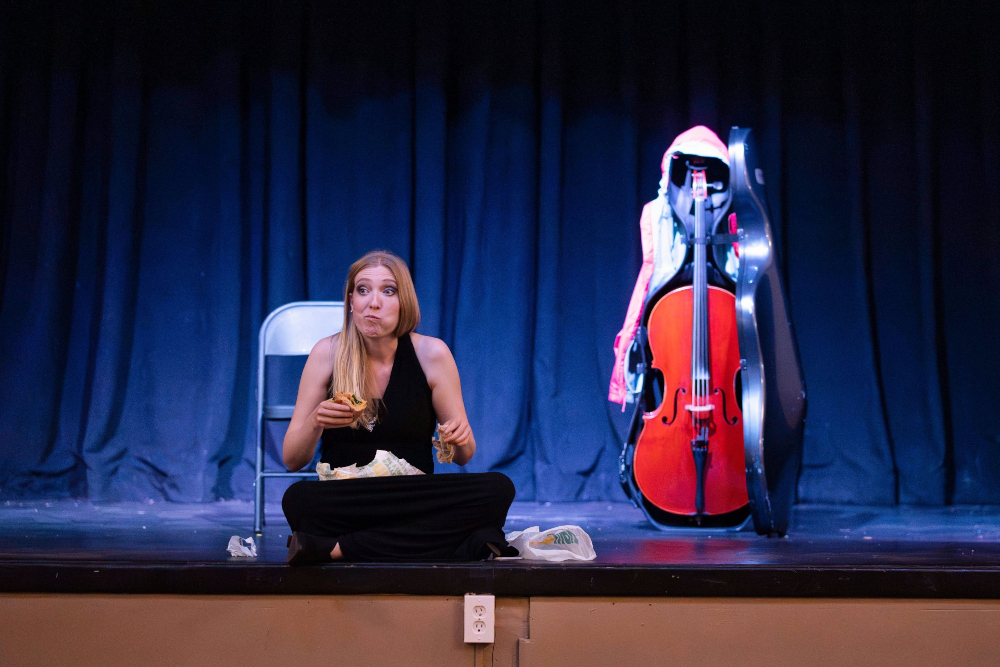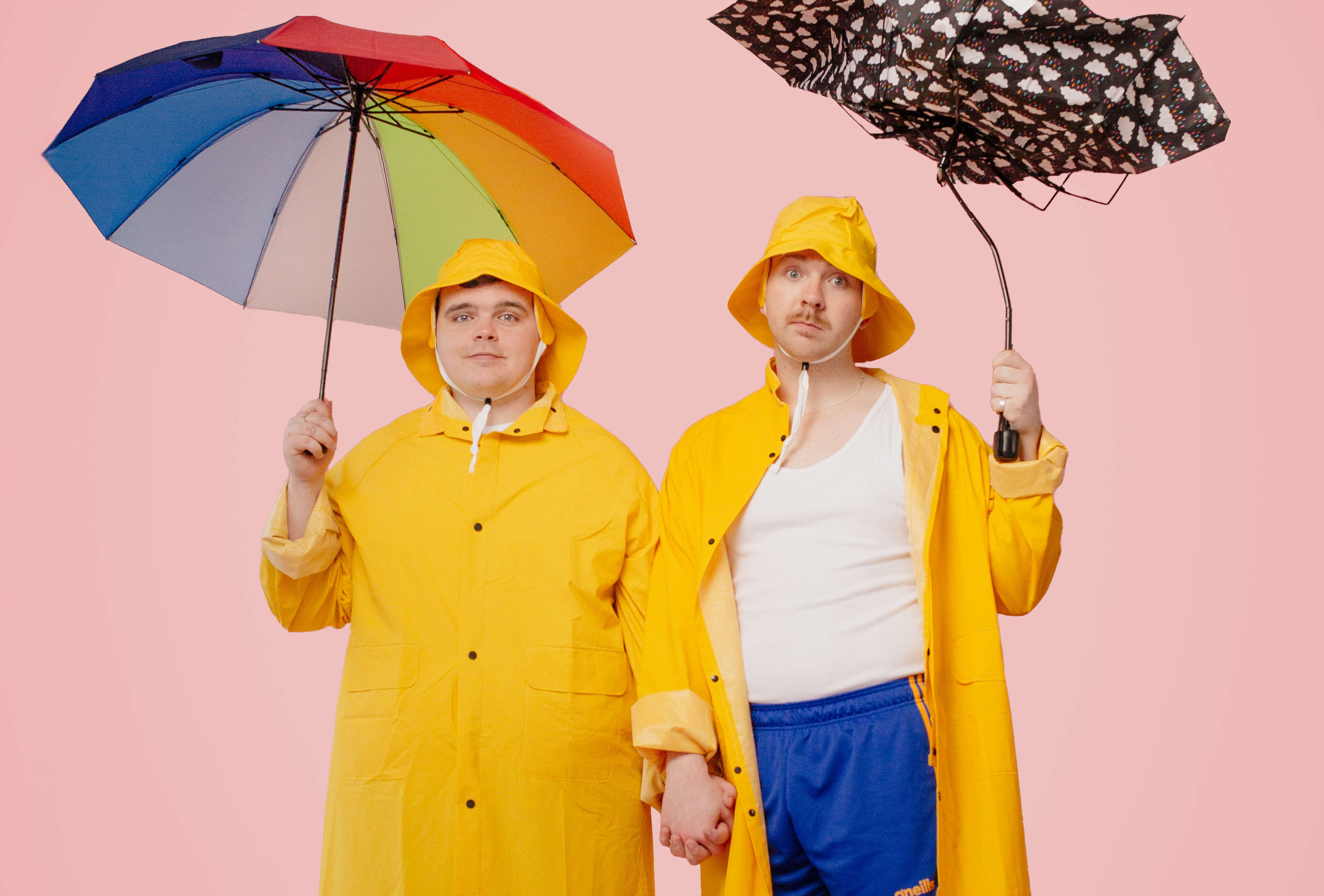The Ode Islands, Pleasance at EICC ★★★★
I might be going out on a limb here, but you’re unlikely to encounter anything quite like The Ode Islands elsewhere on the Fringe – perhaps anywhere, to be honest. That’s both in terms of form and content. Let’s get the first of those out of the way: Irish-born, Hastings-based solo performer Ornagh (yes, she’s single-named) dances, acts and lip-synchs sandwiched between two screens, interacting with intricate CGI both as a backdrop of psychedelic landscapes and in the foreground as monsters, demons and more. The effect isn’t always 100% faultless, but it’s still very effective (and sitting in the middle or back of the Edinburgh International Conference Centre’s comfy Lammermuir Theatre might help with experiencing it).
So much for the technical side, impressive though that is. More mind-bending is what Ornagh produces through her multi-level, semi-3D staging: a world of muscly minotaurs, retro ads, hippo-dogs, and a bizarre, island-hopping journey that feels more like a voyage into Ornagh’s subconscious, with all the hallucinatory imagery that that implies. On a visual level, it’s sumptuous, sometimes deeply alienating, often intensely trippy. Thematically, however, it delves somewhat elusively into questions of bodily perception, sexuality, friendship, self and plenty more, even if by its nature it’s an episodic journey, one whose colourful stops are probably more convincing than its overall trajectory.
In terms of technical achievements, The Ode Islands is both inspiring and captivating, with that particular sense of enjoyment that comes from marvelling at how something’s being done while simultaneously being caught up in what it is. Ben Dawson’s pounding score adds hugely to the experience – it’s somewhat overwhelming, but evocative all the same. More importantly, though, Ornagh clearly has something to say using her immersive technology: something deeply beautiful, strangely surreal, not always crystal-clear in its intent, but often profoundly unsettling all the same.
- Run ended
 Delusions and Grandeur, Summerhall ★★★★
Delusions and Grandeur, Summerhall ★★★★
No, we shouldn’t be clapping, Los Angeles cellist and actor Karen Hall (pictured above, image by Prine Photography) explains witheringly. That was only the famous opening movement of Bach’s First Cello Suite, and in classical music, it’s customary only to applaud once the entire work is over.
Not strictly true, of course, but still. It serves as a neat and nicely rug-pulling opening to Hall’s wry dissection of the world of classical music, and – more importantly – her own journey as a performer, from early pleasure to later competition, and the extent to which her cello becomes an inseparable part of her identity, an extension of herself.
Is it healthy? If 10,000 hours makes you an expert, what does her 40,000+ hours of cello playing make her? Well, Hall explains, as her life progressed, the cello became a way of measuring her own success – for good or ill. And over the course of her entertaining, illuminating hour, we not only get the full Bach Suite (nicely and passionately played), but also Hall’s memories of elbowing for attention in chamber music, getting booked for looks rather than talent, and the inevitable (and sometimes surprising) health consequences of a lifetime of bowing and plucking. Plus, of course, the never-satisfied need to please a conductor or colleagues.
Delusions and Grandeur is a perceptive and thoroughly authentic appraisal of a life in music, and a show that looks beyond its specifics to consider the wisdom of devoting one’s sense of self-worth to such a fragile and competitive activity, and why people even value music in the first place. Hall deftly identifies and skewers the pompous assumptions and conventions of classical concert-going, but she has little time, either, for vapid initiatives intended to attract the young. What’s the solution, especially for a woman who’s devoted her life to the field? Hall offers no facile solutions, but provides plenty of insights into the challenges.
It’s an entertaining hour of solo theatre and music, one that’s no doubt illuminating for those unfamiliar with the classical world, though those who are will probably be nodding along in wry recognition. Perhaps the very fact that a life in music seems like such a niche subject for a Fringe show itself speaks volumes. Niche or not, it’s an area in which Hall has plenty of value and interest to contribute.
- Until 25 August
 Shame Show, Pleasance Courtyard ★★★
Shame Show, Pleasance Courtyard ★★★
Storm Seamus is blowing in across Northern Ireland, and TV reception is so bad that young couple Adam and Stevie (geddit?) are forced to act out their own high-camp versions of classic television offerings – through which they slowly confront their mixed feelings about putting down roots among religious bigotry, their reluctance to leave the place they call home, and even the shaky grounds that their whole relationship is based on.
By the time Shame Show has worked its way to its poignant, thoughtful conclusion, its true intent has become clear. To get there, however, it’s taken a loud, queer, sometimes ramshackle, definitely lo-fi journey through The Weakest Twink and Relogaytion Relogaytion Relogaytion, as lame gay gags work their way into treasured TV memories, and real-life couple Colm McCready and Fergus Wachala-Kelly (pictured above, image by James Ward) have unashamedly over-acted their way through song and dance, cringe-worthy sock puppetry, picnic-chair banter and plenty more. Yes, it’s a bit all over the place, just like Adam and Stevie’s partnership, but when the 2000s nostalgia and homespun props all get a bit too much (and, frankly, there are moments where humour is in short supply), McCready and Wachala-Kelly step in with a sense of heartwarming sincerity and an authenticity that’s really quite disarming. To devote almost an entire show to avoidance strategies in a faltering relationship is a bold move, and one that at times struggles to come off. But at the same time, it’s McCready and Wachala-Kelly’s vulnerability and fallibility that gives Shame Show its particular – and very queer – feeling of joy.
- Until 25 August















Add comment